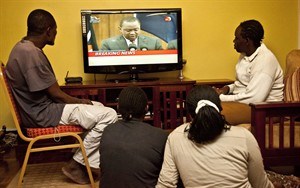
Kenyans watch national television in Nairobi, as Kenyan President Uhuru Kenyatta, addresses the nation, Tuesday, Dec. 2, 2014 on the death of Kenyan quarry workers who were killed in an attack in northern Kenya by suspected Islamic extremists from Somalia. (AP Photo)
Republished December 05, 2014 - 10:22 AM
Original Publication Date December 05, 2014 - 3:55 AM
THE HAGUE, Netherlands - Accusing Kenya of blocking her investigation, the prosecutor for the International Criminal Court on Friday dropped the charges against Kenya's president — including ones for murder and rape.
The decision by Fatou Bensouda to scrap her prosecution of President Uhuru Kenyatta for his alleged involvement in his country's 2007 postelection violence highlights a key challenge for the 12-year-old court — having to rely on governments led by the very suspects it indicts.
Kenyatta had been charged with murder, rape, persecution, deportation and other inhumane acts as an "indirect co-perpetrator" in the violence that left more than 1,000 people dead in 2007 and 2008.
In Bensouda's terse, three-paragraph notice withdrawing the charges, she reserved the right to file charges again if she got more evidence.
"Today is a dark day for international criminal justice," she said.
Prosecutors and judges at the court have accused Kenya of impeding the investigation by failing to hand over the records of Kenyatta's finances and other potential evidence. There also have been widespread reports of witness intimidation, although Kenyan authorities deny that they did that.
Kenyatta was indicted in 2011 but went on to become the president of Kenya in the 2013 election. His government lobbied hard to have the case against him deferred by the U.N. Security Council, arguing the delay was essential because Kenya needed its leader to help fight al-Shabab terrorists.
Njonjo Mue, former head of Kenya's office of the International Center for Transitional Justice, said Kenya had blocked the investigation, intimidated witnesses and "written the rule book on how to evade accountability at the ICC."
"The ICC was the last remaining hope for justice for victims. It sets a worrying precedent where an accused person can take over the state and the state refuses co-operation with the court," Mue said.
Bensouda said key evidence about Kenyatta's actions during the violence "can only be found in Kenya and is only accessible to the prosecution through the assistance of the government of Kenya. This crucial assistance was ultimately not provided."
Inside Kenya's presidential offices, cheers and hugs broke out after the news. Among Kenyatta's first words were: "One down, two to go," a reference to the two pending ICC cases against the deputy president and a Kenyan radio personality.
Kenyatta's spokesman, Manoah Esipisu, told The Associated Press the president was "absolutely delighted" with the ICC decision, while the president said he wanted to run home to share the news with his wife.
Kenyatta also criticized the court, saying it had failed both him and the victims.
"The prosecutor opted to selectively pursue cases in a blatantly biased manner that served vested interests and undermined justice," Kenyatta said in a statement. "It has always been my position that the Kenyan cases at the ICC were rushed there without proper investigation or preparation."
The collapse of the case is a new blow to the credibility of the court's prosecutors. Their office has launched nine full investigations since its establishment in 2002 — all of them in Africa — and has just seven suspects in custody. A further 13 suspects remain at large despite arrest warrants, including Sudanese President Omar al-Bashir, warlord Joseph Kony, and Seif al-Islam Gadhafi, son of slain Libyan dictator Moammar Gadhafi.
Fergal Gaynor, a lawyer for the Kenya victims, accused Kenyatta's administration of blocking the court and disappointing thousands who had suffered in the ethnic bloodletting.
"The victims' quest for justice has been cruelly frustrated, both in Kenya and at the ICC," Gaynor said.
Kenyatta's trial was postponed twice this year while prosecutors attempted to shore up their case after a key prosecution witness refused to testify and another admitted giving false evidence.
Kenyatta was one of six suspects originally charged by the ICC. Only two of them, including Kenyatta's deputy, William Ruto, made it to trial. Charges against the other four have been scrapped.
Rights groups lamented Friday's decision.
"It's clear that a long tradition of impunity in Kenya and pressure on witnesses have been serious obstacles to a fair process before the ICC," said Liz Evenson of Human Rights Watch. "But the roadblocks in the Kenyatta trial make it all the more important for the ICC to figure out how it can move ahead with high-profile cases."
One court watcher said prosecutors must also bear some responsibility for the case collapsing.
While agreeing that Kenya blocked the court, "the lack of evidence points more to a failure of the previous investigative strategy," said Alison Smith, legal counsel for the rights group No Peace Without Justice. "The evidence is out there, the question is why the (prosecutor) did not have it."
____
Associated Press reporters Tom Odula and Khaled Kazziha contributed from Nairobi, Kenya.
News from © The Associated Press, 2014